初中英语常用动词的习惯用法列举
英语动词的用法归纳总结

英语动词的用法归纳总结动词是英语语法中的一个重要部分,它用于表示一个人、物或事物所做的动作、行为或状态。
下面是几种常见的英语动词用法的总结:1. 及物动词(Transitive verbs):表示动作的动词后面可以接一个宾语,宾语接在动词的后面,它们之间有直接的关系。
例如:I kicked the ball.(我踢了球。
)2. 不及物动词(Intransitive verbs):表示动作的动词后面没有宾语,它们自己就是整个谓语,不需要补充其他成分。
例如:He sleeps.(他睡觉。
)3. 联系动词(Linking verbs):用于连接主语和主语的补足语,对主语进行描述或指示。
常见的连接动词有be(是、在)、seem(似乎)、become(变成)等。
例如:He is a teacher.(他是一名教师。
)4. 助动词(Auxiliary verbs):帮助其他动词构成时态、语态和情态的动词。
常见的助动词有be、do、have等。
例如:Heis studying.(他正在学习。
)5. 情态动词(Modal verbs):用于表示说话人对某个行为或状态的看法、推测、建议、许可等。
常见的情态动词有can、could、may、might等。
例如:I can swim.(我会游泳。
)6. 及物动词+副词(Phrasal verbs):由一个动词和一个副词组成的短语,表示特定的意义。
例如:She turned up the volume.(她调高了音量。
)7. 不及物动词+介词(Prepositional verbs):由一个动词和一个介词组成的短语,表示特定的意义。
例如:He insisted on going.(他坚持要去。
)8. 及物动词+宾补(Transitive verbs with object complements):动词之后有一个宾语和一个宾补,它对宾语进行进一步的描述或说明。
例如:They named the baby John.(他们给宝宝起名叫约翰。
七年级上册英语动词用法归纳

七年级上册英语动词用法归纳
以下是七年级上册英语动词用法的一些归纳:
1. be动词(am, is, are):表示存在或状态,不能单独作谓语,需要与表
语一起使用,表示“是”。
2. 实意动词:表示具体的动作或行为,可以单独作谓语。
在英语中,大多数动词都是实意动词。
3. 助动词:没有实际意义,只是帮助构成时态、语态、疑问句等。
常见的助动词有do, does, did等。
4. 情态动词:表示说话人的语气和态度,不能单独作谓语,需要与实意动词一起使用。
常见的情态动词有can, may, must等。
5. 动词不定式:表示未确定或未来的动作,可以在句子中作主语、宾语、定语等。
不定式有to+动词原形,有时可以省略to。
6. 动词现在分词:表示正在进行的动作或状态,可以在句子中作定语、状语、宾语补足语等。
分词有-ing形式。
7. 动词过去分词:表示已经完成的动作或状态,可以在句子中作定语、表语、宾语补足语等。
分词有-ed形式。
希望这些归纳对您有所帮助!如果您还有其他问题或需要更详细的解释,请随时提问。
初中英语知识点归纳常见的动词和动词短语
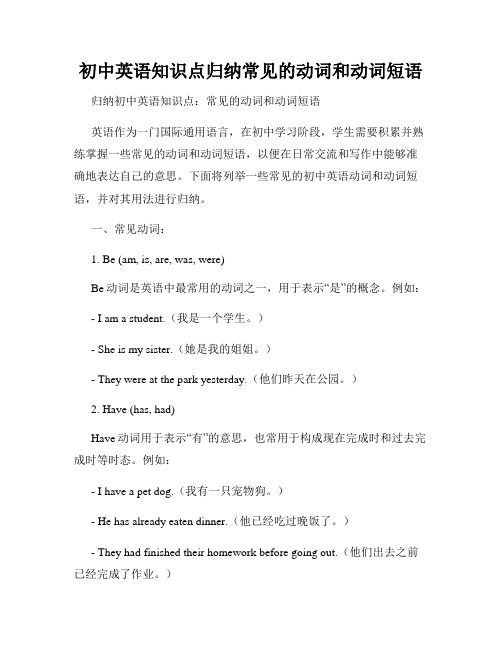
初中英语知识点归纳常见的动词和动词短语归纳初中英语知识点:常见的动词和动词短语英语作为一门国际通用语言,在初中学习阶段,学生需要积累并熟练掌握一些常见的动词和动词短语,以便在日常交流和写作中能够准确地表达自己的意思。
下面将列举一些常见的初中英语动词和动词短语,并对其用法进行归纳。
一、常见动词:1. Be (am, is, are, was, were)Be动词是英语中最常用的动词之一,用于表示“是”的概念。
例如:- I am a student.(我是一个学生。
)- She is my sister.(她是我的姐姐。
)- They were at the park yesterday.(他们昨天在公园。
)2. Have (has, had)Have动词用于表示“有”的意思,也常用于构成现在完成时和过去完成时等时态。
例如:- I have a pet dog.(我有一只宠物狗。
)- He has already eaten dinner.(他已经吃过晚饭了。
)- They had finished their homework before going out.(他们出去之前已经完成了作业。
)3. Do (does, did)Do动词常用于构成否定句、疑问句和一般疑问句等句子结构中。
例如:- I don't like coffee.(我不喜欢咖啡。
)- Does she play the piano?(她会弹钢琴吗?)- Did you go to the park yesterday?(你昨天去了公园吗?)4. Go (goes, went, gone)Go动词表示“去”的动作,也常用于构成进行时态和完成时态等句子。
例如:- I go to school by bus.(我坐公交车去上学。
)- She often goes swimming on weekends.(她经常在周末去游泳。
初三英语动词用法大全
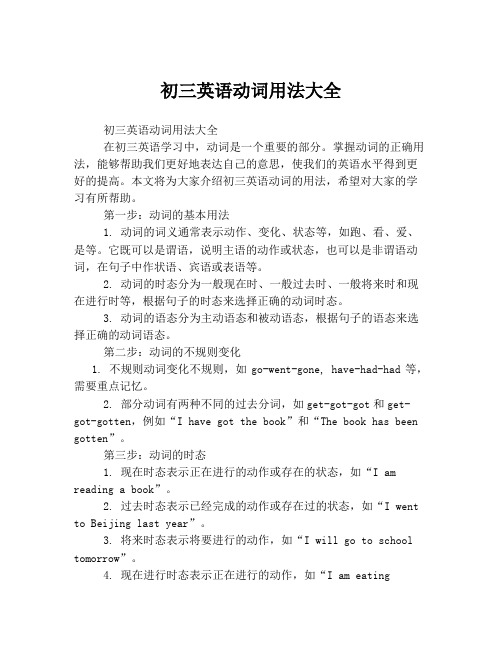
初三英语动词用法大全初三英语动词用法大全在初三英语学习中,动词是一个重要的部分。
掌握动词的正确用法,能够帮助我们更好地表达自己的意思,使我们的英语水平得到更好的提高。
本文将为大家介绍初三英语动词的用法,希望对大家的学习有所帮助。
第一步:动词的基本用法1. 动词的词义通常表示动作、变化、状态等,如跑、看、爱、是等。
它既可以是谓语,说明主语的动作或状态,也可以是非谓语动词,在句子中作状语、宾语或表语等。
2. 动词的时态分为一般现在时、一般过去时、一般将来时和现在进行时等,根据句子的时态来选择正确的动词时态。
3. 动词的语态分为主动语态和被动语态,根据句子的语态来选择正确的动词语态。
第二步:动词的不规则变化1. 不规则动词变化不规则,如go-went-gone, have-had-had等,需要重点记忆。
2. 部分动词有两种不同的过去分词,如get-got-got和get-got-gotten,例如“I have got the book”和“The book has been gotten”。
第三步:动词的时态1. 现在时态表示正在进行的动作或存在的状态,如“I am reading a book”。
2. 过去时态表示已经完成的动作或存在过的状态,如“I went to Beijing last year”。
3. 将来时态表示将要进行的动作,如“I will go to school tomorrow”。
4. 现在进行时态表示正在进行的动作,如“I am eatingdinner right now”。
第四步:动词的语态1. 主动语态表示主语是动作的执行者,其结构为人称代词/名词+ 动词原形。
2. 被动语态表示主语是动作的承受者,其结构为被动语态助动词(am/is/are/was/were)+动词过去分词。
3. 当需要强调动作的执行者时,应选用主动语态;当需要强调动作的承受者或不知道动作的执行者时,应选用被动语态。
动词运用知识点总结
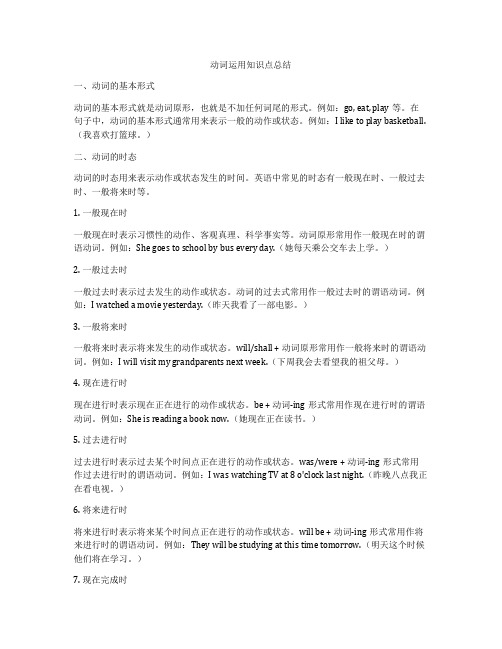
动词运用知识点总结一、动词的基本形式动词的基本形式就是动词原形,也就是不加任何词尾的形式。
例如:go, eat, play等。
在句子中,动词的基本形式通常用来表示一般的动作或状态。
例如:I like to play basketball.(我喜欢打篮球。
)二、动词的时态动词的时态用来表示动作或状态发生的时间。
英语中常见的时态有一般现在时、一般过去时、一般将来时等。
1. 一般现在时一般现在时表示习惯性的动作、客观真理、科学事实等。
动词原形常用作一般现在时的谓语动词。
例如:She goes to school by bus every day.(她每天乘公交车去上学。
)2. 一般过去时一般过去时表示过去发生的动作或状态。
动词的过去式常用作一般过去时的谓语动词。
例如:I watched a movie yesterday.(昨天我看了一部电影。
)3. 一般将来时一般将来时表示将来发生的动作或状态。
will/shall + 动词原形常用作一般将来时的谓语动词。
例如:I will visit my grandparents next week.(下周我会去看望我的祖父母。
)4. 现在进行时现在进行时表示现在正在进行的动作或状态。
be + 动词-ing形式常用作现在进行时的谓语动词。
例如:She is reading a book now.(她现在正在读书。
)5. 过去进行时过去进行时表示过去某个时间点正在进行的动作或状态。
was/were + 动词-ing形式常用作过去进行时的谓语动词。
例如:I was watching TV at 8 o'clock last night.(昨晚八点我正在看电视。
)6. 将来进行时将来进行时表示将来某个时间点正在进行的动作或状态。
will be + 动词-ing形式常用作将来进行时的谓语动词。
例如:They will be studying at this time tomorrow.(明天这个时候他们将在学习。
知识点初一常用动词用法总结

知识点初一常用动词用法总结初一常用动识点总结知识点1:动词的基本形式动词是一个句子中最主要的成分,用来表示动作或状态。
动词的基本形式指的是动词原形,常以动词原形作为主语、谓语或宾语。
知识点2:动词的时态动词的时态主要分为简单时态、进行时态和完成时态。
1. 简单时态a) 一般现在时:表示经常性、习惯性的动作或状态,常与副词always、often、usually等连用。
例句:I often go to the park on weekends.(我经常在周末去公园。
)b) 一般过去时:表示过去某个时间发生的动作或存在的状态。
例句:She watched a movie yesterday.(昨天她看了一部电影。
)c) 一般将来时:表示将来即将发生的动作或存在的状态。
例句:We will have a party next week.(下周我们将举办一场派对。
)2. 进行时态a) 现在进行时:表示现在正在进行的动作。
例句:She is playing basketball now.(她正在打篮球。
)b) 过去进行时:表示过去某个时间正在进行的动作。
例句:They were studying English at that time.(他们那时正在学习英语。
)c) 将来进行时:表示将来某个时间正在进行的动作。
例句:I will be sleeping when you arrive.(当你到达时,我将会正在睡觉。
)3. 完成时态a) 现在完成时:表示过去发生的动作对现在造成的影响或仍然持续的状态。
例句:He has finished his homework.(他已完成作业。
)b) 过去完成时:表示过去某个时间之前已经完成的动作。
例句:She had already left when I arrived.(当我到达时,她已经离开了。
)c) 将来完成时:表示将来某个时间之前已经完成的动作。
例句:I will have read the book by tomorrow.(到明天前,我将会读完这本书。
初中常见的动词的用法
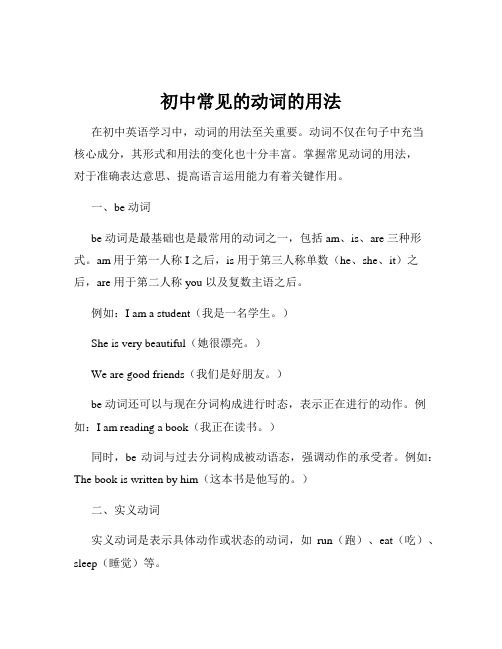
初中常见的动词的用法在初中英语学习中,动词的用法至关重要。
动词不仅在句子中充当核心成分,其形式和用法的变化也十分丰富。
掌握常见动词的用法,对于准确表达意思、提高语言运用能力有着关键作用。
一、be 动词be 动词是最基础也是最常用的动词之一,包括 am、is、are 三种形式。
am 用于第一人称 I 之后,is 用于第三人称单数(he、she、it)之后,are 用于第二人称 you 以及复数主语之后。
例如:I am a student(我是一名学生。
)She is very beautiful(她很漂亮。
)We are good friends(我们是好朋友。
)be 动词还可以与现在分词构成进行时态,表示正在进行的动作。
例如:I am reading a book(我正在读书。
)同时,be 动词与过去分词构成被动语态,强调动作的承受者。
例如:The book is written by him(这本书是他写的。
)二、实义动词实义动词是表示具体动作或状态的动词,如run(跑)、eat(吃)、sleep(睡觉)等。
1、及物动词与不及物动词及物动词后面必须接宾语,才能完整表达意思。
例如:I eat an apple(我吃一个苹果。
)“eat”是及物动词,“apple”是宾语。
不及物动词后面不需要接宾语就能表达完整的意思。
例如:Heruns fast(他跑得很快。
)“run”是不及物动词。
2、动词的时态一般现在时:表示经常发生的动作或存在的状态。
主语是第三人称单数时,动词要加“s”或“es”。
例如:He studies hard(他学习努力。
)一般过去时:表示过去发生的动作或存在的状态。
动词通常变为过去式,规则动词加“ed”,不规则动词有特殊的变化形式。
例如:I played basketball yesterday(我昨天打篮球了。
)现在进行时:表示正在进行的动作,由“be 动词+现在分词”构成。
例如:They are playing football now(他们现在正在踢足球。
初一英语动词用法归纳
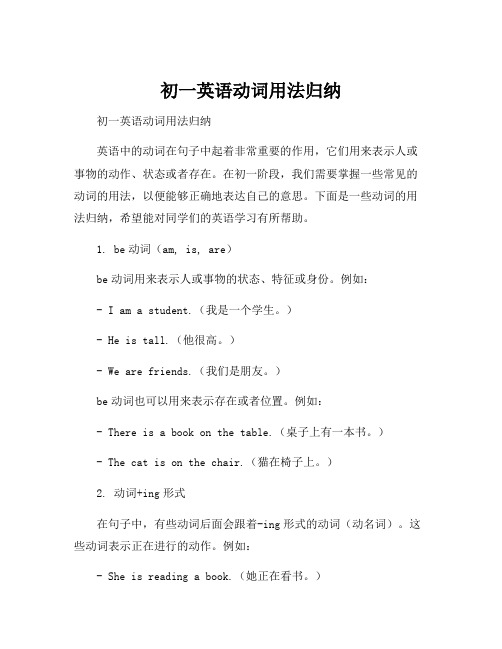
初一英语动词用法归纳初一英语动词用法归纳英语中的动词在句子中起着非常重要的作用,它们用来表示人或事物的动作、状态或者存在。
在初一阶段,我们需要掌握一些常见的动词的用法,以便能够正确地表达自己的意思。
下面是一些动词的用法归纳,希望能对同学们的英语学习有所帮助。
1. be动词(am, is, are)be动词用来表示人或事物的状态、特征或身份。
例如:- I am a student.(我是一个学生。
)- He is tall.(他很高。
)- We are friends.(我们是朋友。
)be动词也可以用来表示存在或者位置。
例如:- There is a book on the table.(桌子上有一本书。
)- The cat is on the chair.(猫在椅子上。
)2. 动词+ing形式在句子中,有些动词后面会跟着-ing形式的动词(动名词)。
这些动词表示正在进行的动作。
例如:- She is reading a book.(她正在看书。
)- We are playing basketball.(我们正在打篮球。
)常见的动词+ing形式的用法还包括喜欢、爱好等。
例如:- I enjoy listening to music.(我喜欢听音乐。
)- He loves playing football.(他喜欢踢足球。
)3. 动词+s形式在句子中,第三人称单数主语后面的动词要加上-s形式。
例如:- She runs in the park every morning.(她每天早上在公园里跑步。
)- It eats fish.(它吃鱼。
)这些动词包括喜欢、有、需要等。
例如:- She likes reading books.(她喜欢读书。
)- He has two sisters.(他有两个姐姐。
)4. 助动词(can, could, may, might, must, shall, should, will, would)助动词用来帮助其他动词的时态、语态、情态等方面的表达。
习惯用法
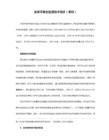
bring up 抚养
bring down 降低
bring out 出版
call
call off 取消
call for 邀约;请求
call in 召集
call on 拜访
call up 召集,动员;打电话;使人想起
=cannot hold back from doing Sth.
=cannot keep back from doing Sth.
=cannot choose + 动词原形
=cannot but + 动词原形
cannot help but do sth. 禁不住要做某事(用不带to的动词不id somebody in
aim at
apologetic for
apologize for
apprehensive of 对...担忧
aware of
awkward at
be afraid of
be capable of
be engaged in
be fond of
reject
relinquish
relish vt.爱好;喜欢
renounce
report
require
resent v.愤恨, 怨恨
resist
risk
sanction
shirk vi.逃避, 推卸
vt.逃避
shun vt.避开, 避免
stand
substantiate vt.使实体化, 证实
call back 回电话
consist
有关动名词的习惯用法

有关动名词的习惯用法在英语中,现在分词和动名词统称为ING FORM,它们在句中的用法一般在教材和语法书中都有较为详细的论述,但在实际运用中,动名词还有不少特殊句型和习惯用法,常为学生所忽略。
本文拟就这些句型和用法作一些简单的归纳。
一、cannot help+doing sth. 意思为“不禁、忍不住、不得不”例如:She couldn’t help crying when she heard the bad news.她听到那个坏消息时,忍不住哭起来。
类似的惯用句型还有:cannot stand / bear+doing sth.例如:I can’t stand waiting any longer.再等下去我可受不了。
I won’t bear your talking to me like that.我不能忍受你跟我那样谈话。
二、How/ What about+doing sth.?意思为“…怎么样?”常用来征求别人的意见。
例如:How about going out for a walk?出去散散步怎么样?What about playing basketball?打篮球怎么样?三、be worth+doing sth.意思为“值得干某事”例如:This book is well worth reading again.这本书很值得再读一遍。
注意:这个句型中的动名词总是用主动形式表示被动意义。
类似的句型还有:worth while+doing sth.例如:He isn’t worth while doing that.做那件事不上算。
四、feel like+doing sth.意思为“想要…”例如:Do you feel like having a word with her?你想和她说句话吗?Today I don’t feel like going home.今天我不想回家。
注意:在这个句型中,like在这时是介词,而不是动词;并且该句型多用于疑问句或否定句中。
初中英语常用动词归纳

It’s getting warmer and warmer
d. 与always, constantly, forever 等词连用,表示反复发生的动作 或持续存在的状态,往往带有说话人的主观色彩.
You are always changinge lived in Beijing? 备注:暂时性动词不能与for…, since…,How long…等
表示段时间 的短语同时使用。
现在完成时的基本用法:
1.表示过去发生的动作对现在造成的影响或结果。 标志词:already(用于肯定句)、yet(用于否定句)、ever、never、 just、before等。
since five years ago
3.瞬间动词:一时的动作,不能与表示延续性的时间状语连用。
begin. go. come. leave. buy. arrive. give. find.
I am doing my homework now. 注意: start,leave,go,come等的一般现在时可表示按 规定要发生 的未来动作,如列车将离开。
练习
( ) 1 -_C____ they often ___ these old men?
-Yes, they___.
A. Do; help; are
2) 客观真理,客观存在,科学事实。
The earth moves around the sun. Shanghai lies in the east of China.
3) 表示格言或警句中。
Pride goes before a fall. 骄者必败。 4) 现在时刻的状态、能力、性格、个性。
初中英语常用动词习惯用法72例

初中英语常用动词习惯用法72例1. allow sb. to do sth. 允许某人去做某事(后接动词不定式例句:My father allowed me to go out for a walk after finishing my homework.2. Asked sb. (not to do sth. 叫某人做事某事(叫某人不要去做某事例句:(1My father asked me to study hard. (2He asked me not to swim alone.Be asked to do sth. 被叫去做某事/被邀请去做某事例句:I was asked to have a dinner with them yesterday3. be afraid to do sth. 害怕做某事She is afraid to ask me questions.4. be afraid of doing sth. 害怕做某事I am afraid of going out at night.5. be afraid of sth. 害怕某物He is afraid of snakes.6. be amazed to do sth. 对做某事感到惊讶He was amazed to meet the girl there.be amazed at sth. 对某事感到惊讶They were amazed at the news.7. Be busy doing/with sth. 忙于做某事(常考e.g: (1 I was busy washing my car at that time. 那时候我正忙于清洗我的车子。
(2 I am busy with my work.8. be coming/going/leaving/flying/moving/dying(某些位移动词用进行时态时表将来例句:The bus is coming/the dog is dying.9. be excited to do sth. 对做……感到兴奋Jacky was excited to travel there by plane.be excited at sth. 例句:Lily was excited at his words.be excited about doing sth 例句:He was excited about passing the exam without going over books.10. be frightened to do sth. 害怕去做某事Sam is frightened to ride a horse.11. be glad/happy to do sth. 高兴去做某事例句:She is happy to clean the blackboard with me.be pleased to do sth. 高兴做某事例句:she was pleased to help the old man yesterday.be pleased with sth. 对某事感到高兴/满意例句:The teacher was pleased with my answer.12. be interested in sth./doing sth. 对某事感兴趣/对做某事感兴趣she is interested in swimming in the river. My brother is interested in Chinese.13. be/get ready for/to do sth. Be ready for sth. 为某事做好了准备例句:We are ready for the exam.Be ready to do sth. 为做某事做好了准备例句:We are ready to have a birthday party for her.get ready for sth.为某事在做准备W e are getting ready for the exam.get ready for sth. 为做某事而做准备13. be sorry to do sth. 对做某事感到抱歉14. be surprised to do sth. 对做某事感到惊奇be surprised at sth. 对某事感到惊奇15. be worth doing sth. 值得做某事(worth 后接动词-ing形式,常考16. begin to do sth. begin/start to do/doing sth.17. can/be able to afford (to buy sth. 有能力购买(供……18. can/may/must do sth. could/would/should/might do sth.19. can’t wait to do sth. 迫不急待地去做某事20. decide to do sth. 决定去做某事make up one’s mind to do sth. 下决心去做某事(常考make a decision to do sth. 对做某事作出决定21. deserve to do sth. 值得/应该做……22. encourage sb. to do sth. 鼓励某人去做某事23. enjoy doing sth. 乐意去做某事24. expect (sb. to do sth. 期望去做某事25. fail to do sth. 做某事失败succeed doing sth. 成功做了某事26. finish doing sth. 做完某事(后接动词-ing形式 (常考27. follow sb to do sth. 跟随某人去做某事28. get sb. to do sth. make sb. do sth. let sb. do sth.29. get/have a chance to do sth. 得到一个做某事的机会30. give/pass/show/lend/sell sb. sth./ sth. to sb. buy/get/bring sb. sth. / sth. for sb.31. go on to do sth. 继续做事(常考 go on doing sth. 继续做事(常考32. hate to do/doing sth. 讨厌/不喜欢做某事33. have fun doing sth.34. have problems doing sth. 做某事遇到困难35. have sb. do sth. have sth. done have sth. to do 有事要做36. hear sb. do sth. 听到某人做某事(后接动词原形,常考 hear sb. doing sth. 听到某人正在做某事(常见37. help to do sth. 帮忙做某事help sb. (to do sth. 帮助某人做某事38. hope/wish to do sth. 希望做某事wish sb. to do sth. 希望某人做某事39. I t seems that 这像是……(后接从句seem to do sth.seem +adj.40. It’s + adj.+(for sb. to do sth.It’s + adj. +(of sb. to do sth.e.g: It’s glad for him to hear the news.41. It takes sb. some time/money to do sth. 花费某人多长时间做某事(常考42. pay …for…cost spend…on….. it take …to do sth.43. It’s best for sb to do sth.. 对某人来说做某事是最好的had better do sth. 最好做某事(注意had没有时态和人称的变化,better后接动词原形44. It’s time for sb. to do sth. 是某人做某事的时候了45. keep (ondoing sth. 坚持做某事(常考keep sb. doing sth. 让某人做某事(常考keep sb. from doing sth. 阻止某人做某事(常考keep sb./ sth. +adj.例:keep the book for 2 days 借这本书两天(不要用borrow或lend46. learn to do sth. 学做某事learn sth. from sb. 向某人学习47. like to do/doing sth. 喜欢做某事like sb. to do sth. 喜欢某人做某事48. need to do sth.需要做某事need doing sth./to be done 需要做某事/某物需要(修理等等need sth .需要某物needn’t do sth.不必要做某事49. prefer to do sth. rather than do sth. 宁愿……而不愿……(常考prefer doing sth. to doing sth. 喜欢做……胜过做……e.g: I prefer reading books to going shopping. 比起购物来,我更爱读书。
英语动词时候用法

英语动词时候用法英语中动词有不同的时态形式,根据不同的情况和时态可以使用不同的动词时态。
下面是一些常用的英语动词时态用法:1. 一般现在时(Simple Present Tense):表示经常性的行为、习惯、真理或普遍事实。
例句:I go to school every day.(我每天去上学。
)2. 一般过去时(Simple Past Tense):表示过去一些时间或事情。
例句:She watched a movie last night.(昨晚她看了一部电影。
)3. 现在进行时(Present Continuous Tense):表示现在正在进行的动作。
例句:They are playing soccer in the park.(他们正在公园里踢足球。
)4. 过去进行时(Past Continuous Tense):表示过去一些时间正在进行的动作。
例句:We were studying for the exam yesterday.(昨天我们正在为考试复习。
)5. 现在完成时(Present Perfect Tense):表示过去一些时间发生的动作对现在造成的影响。
例句:I have finished my homework.(我已经完成了作业。
)6. 过去完成时(Past Perfect Tense):表示过去一些时间已经完成的动作。
例句:She had already left when I arrived.(我到达时她已经离开了。
)7. 将来时(Future Tense):表示将来会发生的动作。
例句:They will go to the beach tomorrow.(他们明天会去海滩。
)以上只是一些基本的动词时态用法,实际应用中还有更多不同的时态,如进行时态、完成进行时态等。
了解和熟练使用不同的动词时态可以帮助你准确地表达不同的动作在时间上的关系。
英语中动词的用法总结

英语中动词的用法总结动词是英语中最主要的词类之一,用于表示行为、状态或存在。
以下是动词的用法总结:1. 行为动词:用于表示人或物体的具体行为,如run(跑)、jump (跳)、eat(吃)等。
2. 状态动词:用于表示状态或存在,如be(是)、seem(似乎)、have(有)等。
3. 助动词:辅助其他动词的动词,用于构成时态、语态、否定等,如be、do、have等。
4. 不及物动词:后面不加宾语的动词,表示动作发出者是主语本身,如sleep(睡觉)、arrive(到达)等。
5. 及物动词:后面需要加宾语的动词,表示动作的直接对象,如read(读)、buy(买)等。
6. 及物和不及物动词:有些动词既可以是及物动词,也可以是不及物动词,具体取决于是否加宾语,如open(打开)和open the door(打开门)。
7. 及物动词的间接宾语和直接宾语:有些及物动词需要两个宾语,一个是直接宾语表示动作的直接对象,另一个是间接宾语表示动作的间接对象,如give(给)。
8. 及物动词的宾语补足语:有些及物动词需要宾语补足语来补充说明动作,使句子更完整,如make(使成为)、call(称呼)等。
9. 不定式:动词的一种形式,常以to开头,作为动词短语的基本形式,如to go(去)、to eat(吃)等。
10. 分词:动词的一种形式,常用于进行时态和完成时态,如running(正在跑)、eaten(已吃)等。
11. 动名词:动词的一种形式,用作名词,表示一种动作或行为,如running(跑步)、swimming(游泳)等。
总体来说,动词在英语中有多种用法,具体用法根据上下文和语法规则来决定。
理解动词的不同用法,可以帮助我们更好地理解和运用英语。
动词学习常见的动词
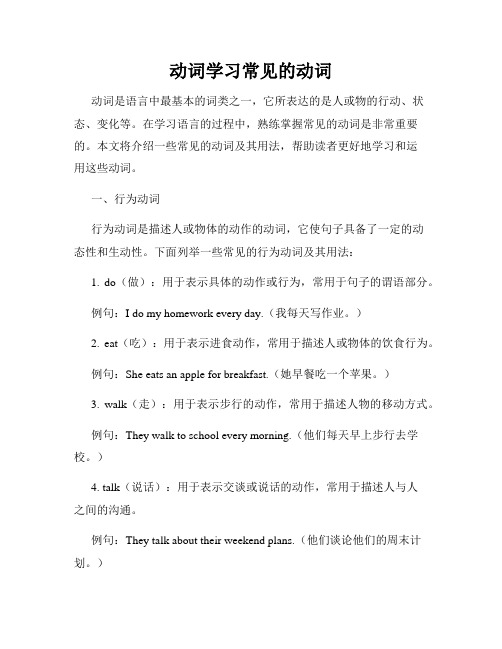
动词学习常见的动词动词是语言中最基本的词类之一,它所表达的是人或物的行动、状态、变化等。
在学习语言的过程中,熟练掌握常见的动词是非常重要的。
本文将介绍一些常见的动词及其用法,帮助读者更好地学习和运用这些动词。
一、行为动词行为动词是描述人或物体的动作的动词,它使句子具备了一定的动态性和生动性。
下面列举一些常见的行为动词及其用法:1. do(做):用于表示具体的动作或行为,常用于句子的谓语部分。
例句:I do my homework every day.(我每天写作业。
)2. eat(吃):用于表示进食动作,常用于描述人或物体的饮食行为。
例句:She eats an apple for breakfast.(她早餐吃一个苹果。
)3. walk(走):用于表示步行的动作,常用于描述人物的移动方式。
例句:They walk to school every morning.(他们每天早上步行去学校。
)4. talk(说话):用于表示交谈或说话的动作,常用于描述人与人之间的沟通。
例句:They talk about their weekend plans.(他们谈论他们的周末计划。
)二、状态动词状态动词是描述人或物体的状态或特征的动词,它使句子更注重表达主语的状态和条件。
下面列举一些常见的状态动词及其用法:1. be(是):表示身份、职业、性格、属性等的动词,常用于构成句子的谓语部分。
例句:He is a doctor.(他是一名医生。
)2. feel(感觉):用于表示感觉或心理状态的动词,常用于描述人的感受或情绪。
例句:I feel happy today.(我今天感到很高兴。
)3. seem(似乎):用于表示某种外在的或表面上的状态,常用于描述事物的外观或现象。
例句:It seems that it will rain soon.(看起来天要下雨了。
)4. appear(出现):用于表示某人或某物的出现,常用于描述情景或事件的发生。
英语中的习惯用法

英语中的习惯用法★ 要点1.It’s the first time that……….(从句中用现在完成时)It was for the first time that………(强调句,对状语for the first time进行强调)It’s (high) time that……..(从句中用过去时或should do)2.It’s the same with sb. / So it is with sb.表示某人也如此(用于前句中既有肯定又有否定或两个不同类的谓语动词)3.…be about to do / be doing……when…….正要做/正在做……就在那时…….4 A is twice / three times as +原级+as BA is twice / three times the n. of B.A is twice / three times +比较级+than B5. It’s a waste of time / money doing / to do…It’s no use / good doing………It’s possible / probable / (un) likely that……….It makes great / no sense to do……做某事很有/没意义6. There’s no use / good doing…….There’s no sense / point (in) doing……There is no need for sth. / to do…….There is (no) possibility that…………(同位语从句)7.The+比较级…….., the+比较级………越…….., 越…….注意:前半句为从句,用一般现在时代替将来时;8. It seems / appears ( to sb. ) that sb…….在某人看来某人……….= Sb. seems / appears to be / to do / to be doing / to have done……..It seems / looks as if……….好象/似乎……..9.It (so) happened that sb. ……..某人碰巧……..= Sb. happened to be / to do / to be doing / to have done…..10.It is said / thought / believed / hoped / supposed …….that sb………=Sb. is said to be / to do / to be doing / to have done……….(注意:这种句型里如带动词hope则不能变成简单句,因为无hope sb. to do结构)12 …….such…….that…….如此…….以致于(引导结果状语从句)…….such……..as……像……..的这种……(as为关系代词,引导定语从句,在从句里充当主、宾、表)13. Do you mind if I do sth.? / Would you mind if I did sth.?14. The chance is that……../ (The )Chances are that……….很可能…….15.Check / Make sure / See to it / See that……..(从句中常用一般现在时) 确信/务必……..16. depend on it that……..取决于see to it that…….负责/设法做到…….注意:除了except / but / in等介词可以直接接that从句,其它介词后必须用it做形式宾语;17.It is / was +介词短语/ 从句/ 名词/代词等+that………How / When / Where / Why is / was it that………..?注意:此句型为强调句,当被强调的为表示人的词时,还可用who连接;强调主语时,从句后的谓语动词应与前面的主语保持一致;注意与定语从句的区别)18 .How is it that……..(这几个句型都表示“怎么会…….?” “怎么发生的?”)How come+从句?How does / did sth. come about? ( How did it come about that…….?)如:How come you are late again?19. There seems / appears / happens to be / must be / can’t be / is (are, was, were) said to be /is (are, was, were) thought to be…….表示 “.似乎有/碰巧有/一定有/不可能有/ 据说有/认为有……..”介词(如of )there beingwant / wish / expect there to be要/希望/期待有……..adj. / adv. enough for there to be…….足够…….会有…….注意:there being / there to be为there be的非谓语形式;It is said / thought that there is / are……=There is / was / are / were said (thought) to be……. 如:I have never dream of there being such a good chance for me.It won’t be cold enough for there to be a frost tonight.20. 疑问词+插入语+陈述语序?Who do you think he’ll have attend the meeting?21. But for + n. / pron., sb. / sth. would (not) have done…..要不是……., 某人早就……(表示虚拟语气)=If it had not been for…..,……./ If there had not been ……., ……..22. It won(’t) be long before +从句(从句中用一般现在时)不久/很久就要…….It was (not) long before+从句(从句中用一般过去时)不久/很久才……..23. Those who………….(从句及主句中谓语动词用复数形式).Anyone who…………= Whoever………..(从句及主句中谓语动词用单数形式) 24…….主句(一般现在时或过去时)…...when从句….(might / should do 或might / should have done) 表示”对比”,意思为“本该……(可)而却”,主句中为陈述语气,从句里为虚拟语气,如:Why are you here when you should be in school?你本该上学的怎么在这儿?He stopped trying when he might have succeeded .本该已成功了他却停止努力了.25. There is ./ Sb. have no doubt that………(同位语从句,that不可省略)There is / Sb. have some doubt whether……..(同位语从句不可用if)Sb. doubt if / whether…….Sb. don’t doubt that………26 . immediately / directly / instantly / the moment +从句on / upon + n. / doingNo sooner had sb. done than …….(过去时)Hardly had sb. done when……..(过去时)注意:这几个结构都表示“一…….就”;27. every time / each time / the last time / the first time / next time +从句(名词性短语引导一个时间状语句)anywhere / everywhere +从句(相当于wherever引导的地点状语从句)You can go anywhere you like.Next time you come, please bring your son along.28.If only / I wish +从句(用过去类时态) 表示虚拟语气, “要是…….就好了” “但愿……就好了!”29 .Considering + n. 或 pron. 或 that从句/ Seeing that……….考虑到/鉴于…….Given + n. / pron作状语,表示“在有……的情况下” “如果有” “假定”,有时也表示”考虑到”Seeing (that) he refused to help us, there is no reason why we should help him now.Given good health, I hope to finish the work this year.Given their inexperience / that they are inexperienced, they’ve done a good job.30.There was a time when…….曾经有那么一度……….31.other than与no, not, none等否定词连用,表示肯定意思,如:It was none other than Mr. Smith.这正是Smith先生.32. Not until…….did / do/ does / will sb. do……It was / is not until ……that sb………33.It’s (un) like sb. to do / to have done……做某事很像某人/ 做某事可不像某人34.It remains to be seen Wh--words ……..是否…….还有待于看.(不用that, if作连接词)35.It only remains for sb. to do……剩下的只是要某人做某事.We’ve got everything ready. It only remains for you to come to dinner.36.One moment……., and now………刚才一会儿还在做……而现在却……..37.Not all / both / everyone………表示部分否定38. Such is / are……..这(些)就是…….(谓语动词单复数由后面名词决定)39. I’d rather (not) do / have done……我宁愿…..I’d rather +从句(从句中用过去时或过去完成时)40. It’s important / necessary / strange / surprising….+that……(用陈述语气或should do)41. I like / hate / appreciate it that / when等从句 (it表示后面从句的这种情况)I appreciate it if you will give me a hand.42. By the time +从句(一般现在时/过去时),主句(将来完成时/过去完成时)43………., as is often the case with sb. / as is usual with sb.(as引导非限制性定语从句)44 in case / lest / for fear that…….(从句中用陈述语气或should do)45.While置于句首可表示As long as 或 AlthoughWhile there is life there is hope.While I admit his good points, I can see his bad ones.46. can not ( never) ……too +adj. (adv. ) / adj. (adv.) + enough “越……越好”“非常”too + adj. ( anxious / eager / willing / ready / glad等)+to do….表示肯定意思I can’t thank you enough.我非常感激你.He was too glad to see his father.=He was very glad to see his father.47. not / neve等表示否定的词与比较级连用表示最高级,如:-----Do you agree with his suggestion? -------I can’t agree more.48. What if……..要是…….怎么办?What if he doesn’t come tomorrow?49. more……..than与其…….不如……..He is more nervous than frightened.50. It is / has been +一段时间+since从句(从句中如为延续性动词,则实际表示的意思相反)It is two years since he drank.他不喝酒已两年了.★ :练习题Mr. Smith didn’t understand ______ made his son so upset this morning.A. what was itB. why it was thisC. how that wasD. what it was that-----Did you have a good sleep last night?----Yes, never sleep _______.A. badlyB. betterC. worseD. bestWe are only _____ glad to do anything we can _______ her.A.too; to helpB. very; help C too; help D. very; helping-----How come you are late for class again?-------_____________.A. Because I missed the busB. By bus and then on footC. Please excuse meD. It’s quite wrong_______more than 3,000 languages in the world.A. There are thought to beB. There is thought to beC. They are thought to beD. It is thought to be-----George is a wise person.-----But in my opinion, he is ______ than wise.A. clevererB. braverC. more braveD. less brave-----So can I ask you a few fairly straightforward questions about yourself?-----No problem. I like ________ when people are open and direct.A. thatB. thisC. itD. them----______I move the picture over here?----I suppose it’ll look better.A. How ifB. What aboutC. How aboutD. What ifChina has produced ______ this year as it did in 2002.A. as twice much steelB. twice steel as muchC. twice as much steelD. as much steel twice10.-----_______was it ______ you discovered the secret of his?------Totally by chance.A. How; whenB. What; thatC. What; whenD. How; that11.-----Who on earth could it be?------It was _______ other than Clint Eastwood.A. noneB. nothingC. notD. nobody12._____his age, he did it quite well, so don’t ______ him any more.A Given; blame B. Considered; say C. To regard; scold D. Considering; speak13.No sooner _____ themselves in their seats in the theatre ______ the curtain went up.A. they have settled; beforeB. had they settled; thanC. have they settled; whenD. they had settled; than14. -----Did you meet with the famous space hero, Yang Liwei?------______I had come here earlier!A. If onlyB. If notC. But forD. For fear15.The students expected __________ more reviewing classes before the final exams.A. it would beB. there beingC. it to beD. there to be16.Students shouldn’t be given so difficult a problem _____ they can not work out.A. thatB. whichC. whileD. as17. It was twelve o’clock at midnight _______ they arrived at a lonely village.A. thatB. beforeC. sinceD. when18.-----The exam wasn’t difficult, was it?------No, but I don’t think ______could pass it.A. somebodyB. anybodyC. everybodyD. nobody19.-----I always take care when doing papers on the computer.-----You meant it! One can not be _______careful working on it.A. tooB. veryC. soD. quite20.-----Is Miss White working these days?------No. It is two months since she worked here.------Oh,_____________?A. where is she working nowB. would you please show me the wayC. which is her officeD. is she ill。
英语中的习惯用法
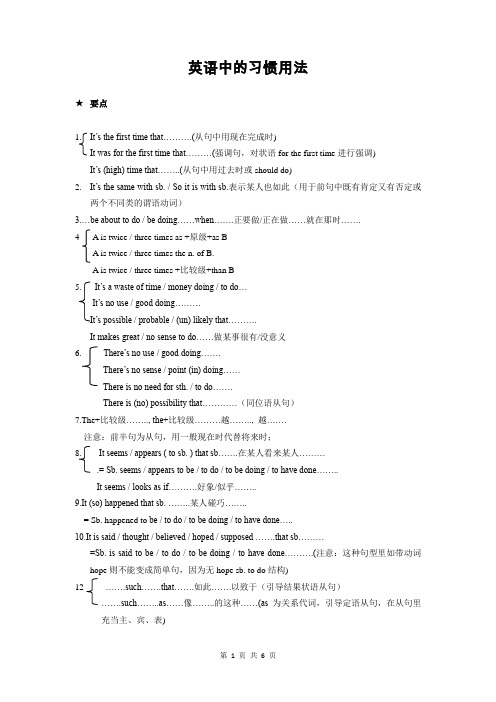
英语中的习惯用法★要点1.It’s the first time that……….(从句中用现在完成时)It was for the first time that………(强调句,对状语for the first time进行强调)It’s (high) time that……..(从句中用过去时或should do)2.It’s the same with sb. / So it is with sb.表示某人也如此(用于前句中既有肯定又有否定或两个不同类的谓语动词)3.…be about to do / be doing……when…….正要做/正在做……就在那时…….4 A is twice / three times as +原级+as BA is twice / three times the n. of B.A is twice / three times +比较级+than B5. It’s a waste of time / money doing / to do…It’s no use / good doing………It makes great / no sense to do……做某事很有/没意义6. There’s no use / good doing…….There’s no sense / point (in) doing……There is no need for sth. / to do…….There is (no) possibility that…………(同位语从句)7.The+比较级…….., the+比较级………越…….., 越…….注意:前半句为从句,用一般现在时代替将来时;8. It seems / appears ( to sb. ) that sb…….在某人看来某人……….= Sb. seems / appears to be / to do / to be doing / to have done……..It seems / looks as if……….好象/似乎……..9.It (so) happened that sb. ……..某人碰巧……..= Sb. happened to be / to do / to be doing / to have done…..10.It is said / thought / believed / hoped / supposed …….that sb………=Sb. is said to be / to do / to be doing / to have done……….(注意:这种句型里如带动词hope则不能变成简单句,因为无hope sb. to do结构)12 …….such…….that…….如此…….以致于(引导结果状语从句)…….such……..as……像……..的这种……(as为关系代词,引导定语从句,在从句里充当主、宾、表)13. Do you mind if I do sth.? / Would you mind if I did sth.?14. The chance is that……../ (The )Chances are that……….很可能…….15.Check / Make sure / See to it / See that……..(从句中常用一般现在时) 确信/务必……..16. depend on it that……..取决于see to it that…….负责/设法做到…….注意:除了except / but / in等介词可以直接接that从句,其它介词后必须用it做形式宾语;17.It is / was +介词短语/ 从句/ 名词/代词等+that………How / When / Where / Why is / was it that………..?注意:此句型为强调句,当被强调的为表示人的词时,还可用who连接;强调主语时,从句后的谓语动词应与前面的主语保持一致;注意与定语从句的区别)18 .How is it that……..(这几个句型都表示“怎么会…….?” “怎么发生的?”)How come+从句?How does / did sth. come about? ( How did it come about that…….?)如:How come you are late again?19. There seems / appears / happens to be / must be / can’t be / is (are, was, were) said to be /is (are, was, were) thought to be…….表示“.似乎有/碰巧有/一定有/不可能有/ 据说有/认为有……..”介词(如of )there beingwant / wish / expect there to be要/希望/期待有……..adj. / adv. enough for there to be…….足够…….会有…….注意:there being / there to be为there be的非谓语形式;It is said / thought that there is / are……=There is / was / are / were said (thought) to be……. 如:I have never dream of there being such a good chance for me.It won’t be cold enough for there to be a frost tonight.20. 疑问词+插入语+陈述语序?Who do you think he’ll have attend the meeting?21. But for + n. / pron., sb. / sth. would (not) have done…..要不是……., 某人早就……(表示虚拟语气)=If it had not been for…..,……./ If there had not been ……., ……..22. It won(’t) be long be fore +从句(从句中用一般现在时)不久/很久就要…….It was (not) long before+从句(从句中用一般过去时)不久/很久才……..23. Those who………….(从句及主句中谓语动词用复数形式).Anyone who…………= Whoever………..(从句及主句中谓语动词用单数形式) 24…….主句(一般现在时或过去时)…...when从句….(might / should do 或might / should have done) 表示”对比”,意思为“本该……(可)而却”,主句中为陈述语气,从句里为虚拟语气,如:Why are you here when you should be in school?你本该上学的怎么在这儿?He stopped trying when he might have succeeded .本该已成功了他却停止努力了.25. There is ./ Sb. have no doubt that………(同位语从句,that不可省略)There is / Sb. have some doubt whether……..(同位语从句不可用if)Sb. doubt if / whether…….Sb. don’t doubt that………26 . immediately / directly / instantly / the moment +从句on / upon + n. / doingNo sooner had sb. done than …….(过去时)Hardly had sb. done when……..(过去时)注意:这几个结构都表示“一…….就”;27. every time / each time / the last time / the first time / next time +从句(名词性短语引导一个时间状语句)anywhere / everywhere +从句(相当于wherever引导的地点状语从句)Y ou can go anywhere you like.Next time you come, please bring your son along.28.If only / I wish +从句(用过去类时态) 表示虚拟语气, “要是…….就好了” “但愿……就好了!”29 .Considering + n. 或pron. 或that从句/ Seeing that……….考虑到/鉴于…….Given + n. / pron作状语,表示“在有……的情况下” “如果有” “假定”,有时也表示”考虑到”Seeing (that) he refused to help us, there is no reason why we should help him now.Given good health, I hope to finish the work this year.Given their inexperience / that they are inexperienced, they’ve done a good job.30.There was a time when…….曾经有那么一度……….31.other than与no, not, none等否定词连用,表示肯定意思,如:It was none other than Mr. Smith.这正是Smith先生.32. Not until…….did /do/ does / will sb. do……It was / is not until ……that sb………33.It’s (un) like sb. to do / to have done……做某事很像某人/ 做某事可不像某人34.It remains to be seen Wh--words ……..是否…….还有待于看.(不用that, if作连接词)35.It only remains for sb. to do……剩下的只是要某人做某事.We’ve got everythin g ready. It only remains for you to come to dinner.36.One moment……., and now………刚才一会儿还在做……而现在却……..37.Not all / both / everyone………表示部分否定38. Such is / are……..这(些)就是…….(谓语动词单复数由后面名词决定)39. I’d rather (not) do / have done……我宁愿…..I’d rather +从句(从句中用过去时或过去完成时)40. It’s important / necessary / strange / surprising….+that……(用陈述语气或should do)41. I like / hate / appreciate it that / when等从句(it表示后面从句的这种情况)I appreciate it if you will give me a hand.42. By the time +从句(一般现在时/过去时),主句(将来完成时/过去完成时)43………., as is often the case with sb. / as is usual with sb.(as引导非限制性定语从句)44 in case / lest / for fear that…….(从句中用陈述语气或should do)45.While置于句首可表示As long as 或AlthoughWhile there is life there is hope.While I admit his good points, I can see his bad ones.46. can not ( never) ……too +adj. (adv. ) / adj. (adv.) + enough “越……越好”“非常”too + adj. ( anxious / eager / willing / ready / glad等)+to do….表示肯定意思I can’t thank you enough.我非常感激你.He was too glad to see his father.=He was very glad to see his father.47. not / neve等表示否定的词与比较级连用表示最高级,如:-----Do you agree with his suggestion? -------I can’t agree more.48. What if……..要是…….怎么办?What if he doesn’t come tomorrow?49. more……..than与其…….不如……..He is more nervous than frightened.50. It is / has been +一段时间+since从句(从句中如为延续性动词,则实际表示的意思相反)It is two years since he drank.他不喝酒已两年了.★:练习题Mr. Smith didn’t understand ______ made his son so upset this morning.A. what was itB. why it was thisC. how that wasD. what it was that-----Did you have a good sleep last night?----Y es, never sleep _______.A. badlyB. betterC. worseD. bestWe are only _____ glad to do anything we can _______ her.A.too; to helpB. very; help C too; help D. very; helping-----How come you are late for class again?-------_____________.A. Because I missed the busB. By bus and then on footC. Please excuse meD. It’s quite wrong_______more than 3,000 languages in the world.A. There are thought to beB. There is thought to beC. They are thought to beD. It is thought to be-----George is a wise person.-----But in my opinion, he is ______ than wise.A. clevererB. braverC. more braveD. less brave-----So can I ask you a few fairly straightforward questions about yourself?-----No problem. I like ________ when people are open and direct.A. thatB. thisC. itD. them----______I move the picture over here?----I suppose it’ll look better.A. How ifB. What aboutC. How aboutD. What ifChina has produced ______ this year as it did in 2002.A. as twice much steelB. twice steel as muchC. twice as much steelD. as much steel twice10.-----_______was it ______ you discovered the secret of his?------Totally by chance.A. How; whenB. What; thatC. What; whenD. How; that11.-----Who on earth could it be?------It was _______ other than Clint Eastwood.A. noneB. nothingC. notD. nobody12._____his age, he did it quite well, so don’t ______ him any more.A Given; blame B. Considered; say C. To regard; scold D. Considering; speak13.No sooner _____ themselves in their seats in the theatre ______ the curtain went up.A. they have settled; beforeB. had they settled; thanC. have they settled; whenD. they had settled; than14. -----Did you meet with the famous space hero, Y ang Liwei?------______I had come here earlier!A. If onlyB. If notC. But forD. For fear15.The students expected __________ more reviewing classes before the final exams.A. it would beB. there beingC. it to beD. there to be16.Students sh ouldn’t be given so difficult a problem _____ they can not work out.A. thatB. whichC. whileD. as17. It was twelve o’clock at midnight _______ they arrived at a lonely village.A. thatB. beforeC. sinceD. when18.-----The exam wasn’t di fficult, was it?------No, but I don’t think ______could pass it.A. somebodyB. anybodyC. everybodyD. nobody19.-----I always take care when doing papers on the computer.-----Y ou meant it! One can not be _______careful working on it.A. tooB. veryC. soD. quite20.-----Is Miss White working these days?------No. It is two months since she worked here.------Oh,_____________?A. where is she working nowB. would you please show me the wayC. which is her officeD. is she ill。
- 1、下载文档前请自行甄别文档内容的完整性,平台不提供额外的编辑、内容补充、找答案等附加服务。
- 2、"仅部分预览"的文档,不可在线预览部分如存在完整性等问题,可反馈申请退款(可完整预览的文档不适用该条件!)。
- 3、如文档侵犯您的权益,请联系客服反馈,我们会尽快为您处理(人工客服工作时间:9:00-18:30)。
初中英语一些常用动词的习惯用法1. allow sb. to do sth. 允许某人去做某事例句:My father allowed me to go out for a walk after finishing my homework.2. asked sb. (not) to do sth. 叫某人做事某事(叫某人不要去做某事)例句:My father asked me to study hard.例句:He asked me not to swim alone.be asked to do sth. 被叫去做某事/被邀请去做某事例句:I was asked to have a dinner with them yesterday.3. be afraid to do sth. 害怕做某事例句:She is afraid to ask me questions.4. be afraid of doing sth. 害怕做某事例句:I am afraid of going out at night.5. be afraid of sth. 害怕某物例句:He is afraid of snakes.6. be amazed to do sth. 对做某事感到惊讶例句:He was amazed to meet the girl there.be amazed at sth. 对某事感到惊讶例句:they were amazed at the news.7. be busy doing/with sth. 忙于做某事(常考)例句:I was busy washing my car at that time. 那时候我正忙于清洗我的车子。
例句:I am busy with my work.8. be coming/going/leaving/fiying/moving/dying(某些位移动词用进行时态时表将来)例句:the bus is coming/the dog is dying.9. be excited to do sth. 对做……感到兴奋例句:Jacky was excited to travel there by plane.be excited at sth.例句:Lily was excited at his words.be excited about doing sth.例句:he was excited about passing the exam without going overing books.10. be frightened to do sth. 害怕去做某事例句:Sam is frightened to ride a horse.11. be glad/happy to do sth. 高兴去做某事例句:she is happy to clean the blackboard with me.be pleased to do sth. 高兴做某事例句:she was pleased to help the old man yesterdaybe pleased with sth. 对某事感到高兴/满意例句:the teacher was pleased with my answer.12. be interested in sth./doing sth. 对某事感兴趣/对做某事感兴趣例句:she is interested in swimming in the river.例句:My brother is interested in Chinese.13. be/get ready for/to do sth. Be ready for sth. 为某事做好了准备例句:We are ready for the exam.Be ready to do sth. 为做某事做好了准备例句:We are ready to have a birthday party for her.get ready for sth.为某事在做准备例句:We are getting ready for the exam.13. be sorry to do sth. 对做某事感到抱歉14. be surprised to do sth. 对做某事感到惊奇be surprised at sth. 对某事感到惊奇15. be worth doing sth. 值得做某事(worth 后接动词-ing形式,常考)16. begin to do sth.begin/start to do/doing sth.17. can/be able to afford (to buy) sth. 有能力购买(供)……18. can/may/must do sth. could/would/should/might do sth.19. can’t wait to do sth. 迫不急待地去做某事20. decide to do sth. 决定去做某事make up one’s mind to do sth. 下决心去做某事(常考) makea decision to do sth. 对做某事作出决定21. deserve to do sth. 值得/应该做……22. encourage sb. to do sth. 鼓励某人去做某事23. enjoy doing sth. 乐意去做某事24. expect (sb.) to do sth. 期望去做某事25. fail to do sth. 做某事失败succeed doing sth. 成功做了某事26. finish doing sth. 做完某事(后接动词-ing形式) (常考)27. follow sb to do sth. 跟随某人去做某事28. get sb. to do sth. make sb. do sth. let sb. do sth.29. get/have a chance to do sth. 得到一个做某事的机会30. give/pass/show/lend/sell sb. sth./ sth. to sb.buy/get/bring sb. sth. / sth. for sb.31. go on to do sth. 继续做事(常考)go on doing sth. 继续做事(常考)32. hate to do/doing sth. 讨厌/不喜欢做某事33. have fun doing sth.34. have problems doing sth. 做某事遇到困难35. have sb. do sth. have sth. done have sth. to do 有事要做36. hear sb. do sth. 听到某人做某事(后接动词原形,常考) hearsb. doing sth. 听到某人正在做某事(常见)37. help to do sth. 帮忙做某事help sb. (to) do sth. 帮助某人做某事38. hope/wish to do sth. 希望做某事wish sb. to do sth. 希望某人做某事39. I t seems that 这像是……(后接从句)seem to do sth. seem +adj.40. It’s + adj.+(for sb.) to do sth.It’s + adj. +(of sb.) to do sthIt’s glad for him to hear the news.41. It takes sb. some time/money to do sth. 花费某人多长时间做某事(常考)42. pay …for…cost spend…on….. it take …to do sth.43. It’s best for sb to do sth.. 对某人来说做某事是最好的had better do sth. 最好做某事(注意had没有时态和人称的变化,better后接动词原形)44. It’s time for sb. to do sth. 是某人做某事的时候了45. keep (on)doing sth. 坚持做某事(常考)keep sb. doing sth. 让某人做某事(常考)keep sb. from doing sth. 阻止某人做某事(常考)keep sb./ sth. +adj.例如:keep the book for 2 days 借这本书两天(不要用borrow 或lend)46. learn to do sth. 学做某事learn sth. from sb. 向某人学习47. like to do/doing sth. 喜欢做某事like sb. to do sth. 喜欢某人做某事48. need to do sth. need doing sth./to be doneneed sth . needn’t do sth.49. prefer to do sth. rather than do sth. 宁愿……而不愿……(常考)prefer doing sth. to doing sth. 喜欢做……胜过做……例句:I prefer reading books to going shopping. 比起购物来,我更爱读书。
prefer to do sth. 喜欢(爱)做某事50. refuse to do sth. 拒绝做……51. remember/forget to do sth. 记得/忘记做某事remember/forget doing sth. 记得/忘记做过某事52. see sb. do sth. 看见某人做某事(结果)see sb. doing sth. 看见某人正在做某事(正在进行中)be seen to do sth. 做某事被看见53. something to eat/drink 一些吃/喝的东西(词不定式放在something等后修饰这些词)例句:I need something to eat. 我要一些吃的东西。
54. spend some time (in)doing sth. /on sth. 花费时间做某事(注意动词要用ing形式)(常考)spend some money on sth./ doing sth. 买……花了多少钱55. Sth. is hard/difficult/easy to do. 做好某事很难/容易56. stop to do sth. 停下来去某事(两件事) (常考)stop doing sth. 停止做某事(一件事) (常考)stop sb. (from) doing sth. 阻止某人做某事(常考)57. take turns to do sth. 轮流做……58. tell sb. (not) to do sth. 叫某人去(不要)做某事be told to do sth. 被告知不要做某事59. There is no need (for sb.) to do sth. 对某人来说没必要做某事60. There is no time (for sb.) to do sth.have no time to do sth. 没时间做某事61. too…(for sb.) to …太……以致不能……so…that…not…enough to do例句:The boy is too young to go to school. 那男孩太小了以致不能上学。
